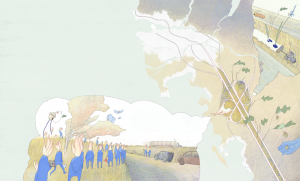An Exploration of Assisted Migrations

With podcast hosts, June Geyer, Ida Nilsen, and Lea Papillon; Music by Ida Nilsen;
And featured guest speakers,
- Mendel Skulski, Podcast host of Future Ecologies;
- Chad Manley, UBC architecture grad, designer, artist and researcher;
- Lasse Lutick, Co-owner of Hybrid 17;
- Nicky Bloom, Landscape architect, adjunct professor at UBC;
- Douglas Justice, Horticulturist and director of botanical gardens.
Join us on Uprooted, a podcast delving into the complex realm of assisted migration within the discipline of landscape architecture. Hosted by Ida, Lea, and June, students at the University of British Columbia, we embark on a journey from the traditional territories of the Musqueam people in Vancouver, BC, to explore the pressing need for assisted migration of plants in the face of climate change.
Through enlightening discussions with experts like Mendel Skulski, Chad Manley, Lasse Lutick, Nicky Bloom, and Douglas Justice, we dissect the implications and applications of assisted migration. From forest management studies to urban landscapes, we confront the challenges and opportunities presented by climate-driven shifts in ecosystems.
As we navigate the intersection of tradition and innovation, we uncover the moral obligations and practical considerations surrounding assisted migration. From redefining notions of native and non-native plant species to negotiating emotional ties to traditional landscapes, we contemplate the path forward in creating resilient and biodiverse ecosystems for the future.
Join us on Uprooted as we re-evaluate restoration strategies and advocate for a more inclusive approach to plant management in the era of climate change.
Direct references in the podcast:
Nature by Design, Future Ecologies Podcast with Mendel Skulski
Neo-Eocene: Making the Geological Now, project by Oliver Kelhammer
Goodbye Hello, project by Chad Manley
Hybrid 17, forest management with Lasse Lutick
Forest Services USDA, on Assisted Migration

Other resources:
Buckley, Yvonne M., and Jane Catford. “Does the Biogeographic Origin of Species Matter? Ecological Effects of Native and Non‐native Species and the Use of Origin to Guide Management.” Journal of Ecology 104, no. 1 (December 12, 2015): 4–17. https://doi.org/10.1111/1365-2745.12501.
Chang, Cynthia C., Benjamin L. Turner, and Richard Bardgett. “Ecological Succession in a Changing World.” The Journal of Ecology 107, no. 2 (2019): 503-509. http://doi.org/10.1111/1365-2745.13132
Crees, Jennifer J., and Samuel T. Turvey. “What Constitutes a ‘Native’ Species? Insights from
the Quaternary Faunal Record.” Biological Conservation 186 (2015): 143–48.
https://doi.org/10.1016/j.biocon.2015.03.007.
Fontaine, Lysiane Chagnon and Brendon M. H. Larson. “The Right Tree at the Right Place? Exploring Urban Foresters’ Perceptions of Assisted Migration.” Urban Forestry & Urban Greening 18, (2016): 221-227.
Handler, S.; Pike, C.; St. Clair, B.; 2018. Assisted Migration. USDA Forest Service Climate Change Resource Center. https://www.fs.usda.gov/ccrc/topics/assisted-migration
Laflower, Danelle M., Matthew D. Hurteau, George W. Koch, Malcolm P. North, Bruce A. Hungate. “Climate-Driven Changes in Forest Succession and the Influence of Management on Forest Carbon Dynamics in the Puget Lowlands of Washington State, USA.” Forest Ecology and Management 362, (2016): 194-204. https://doi.org/10.1016/j.foreco.2015.12.015
Martin, Tara G., Iadine Chadès, Peter Arcese, Peter P. Marra, Hugh P. Possingham, and D. Ryan Norris. “Optimal Conservation of Migratory Species.” PLoS ONE 2, no. 8 (August 15, 2007). https://doi.org/10.1371/journal.pone.0000751.
Teixeira, Catarina Patoilo, Cláudia Oliveira Fernandes, and Jack Ahern. “Adaptive Planting Design and Management Framework for Urban Climate Change Adaptation and Mitigation.” Urban Forestry & Urban Greening 70 (April 1, 2022): 127548. https://doi.org/10.1016/j.ufug.2022.127548.